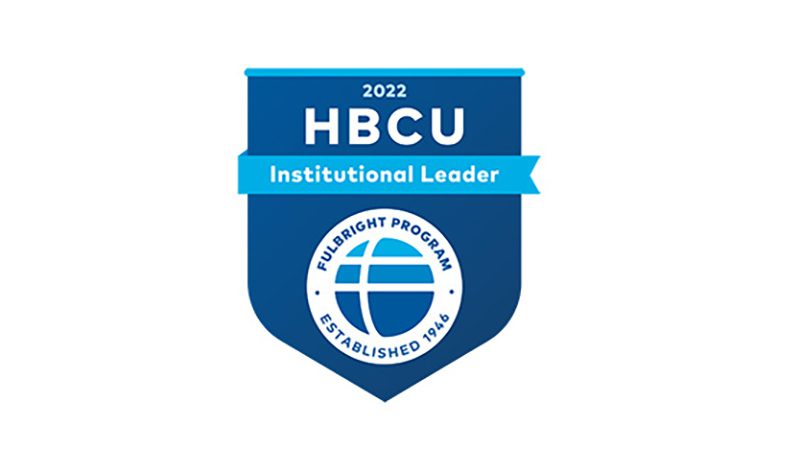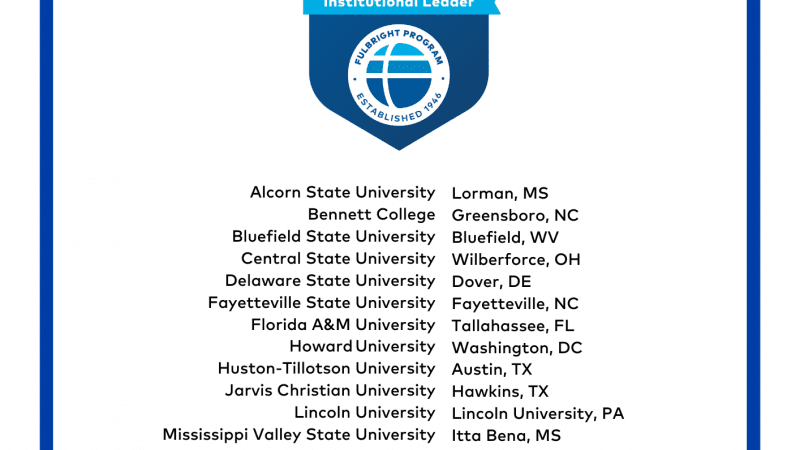Five UNCF-Member Schools Among State Dept.’s Fulbright HBCU Institutional Leaders

The U.S. Department of State’s Bureau of Educational and Cultural Affairs (ECA) has named 19 institutions of higher education as Fulbright Historically Black College and University (HBCU) Institutional Leaders for 2022. ECA established the Fulbright HBCU Institutional Leaders Initiative to recognize and commend the strong partnership between the Fulbright Program and HBCUs and to encourage all HBCUs to increase their engagement with Fulbright to help their students, faculty and staff to study, teach or conduct research abroad and access valuable international experiences and perspectives.
The Fulbright HBCU Institutional Leaders are: Alcorn State University, Bennett College*, Bluefield State University, Central State University, Delaware State University, Fayetteville State University, Florida Agricultural & Mechanical University, Howard University, Huston-Tillotson University*, Jarvis Christian University*, Lincoln University of Pennsylvania, Mississippi Valley State University, Morgan State University, North Carolina A&T State University, Spelman College*, Tennessee State University, Texas Southern University, Tuskegee University* and Virginia State University.
The announcement of the 19 Fulbright HBCU Institutional Leaders was made by the State Department as HBCU leaders prepare to gather in Washington, DC, and virtually for the White House Initiative on HBCUs National HBCU Week Conference, and Fulbright opportunities will be highlighted in events such as the HBCU career and recruitment fair. The institutions will be featured across Fulbright social media platforms and in a collaboration with Watch the Yard, a platform for Black Greek life created by Fulbright alumnus Jonathan Rabb.
Assistant Secretary of State for Educational and Cultural Affairs Lee Satterfield commended the 2022 Fulbright HBCU Institutional Leaders, noting that “HBCUs are an important part of the American and global higher education communities, providing life-changing exchange opportunities for American and international students, faculty, and administrators alike,” and shared her “hope that these institutions’ success encourages all HBCUs to engage further with Fulbright and with the State Department.”
The HBCU Institutional Leader status recognizes engagement across the Fulbright Program, including hosting Fulbright Foreign Language Teaching Assistants, Scholars-in-Residence and other Fulbright Students or Scholars as well as having U.S. students, faculty and staff receive Fulbrights to study, teach or conduct research abroad.
On Nov. 3, a Fulbright HBCU Virtual Workshop will feature best practices for HBCUs to leverage Fulbright Program engagement to support students and faculty, increase campus internationalization, and build global networks. This event is designed for HBCU faculty and staff but is open to all higher education professionals.
 The Fulbright Program is the U.S. government’s flagship international educational exchange program. Since its inception over 75 years ago, the Fulbright Program has given over 400,000 talented and accomplished students, scholars, teachers, artists and professionals of all backgrounds and fields the opportunity to study, teach and conduct research abroad, exchanging ideas and contributing to finding solutions to important international problems.
The Fulbright Program is the U.S. government’s flagship international educational exchange program. Since its inception over 75 years ago, the Fulbright Program has given over 400,000 talented and accomplished students, scholars, teachers, artists and professionals of all backgrounds and fields the opportunity to study, teach and conduct research abroad, exchanging ideas and contributing to finding solutions to important international problems.
Each year, the U.S. Congress appropriates funds to the U.S. Department of State to sponsor the Fulbright Program. Additional funding and in-kind contributions are provided by foreign governments, U.S. and foreign host institutions, non-governmental organizations, private organizations, corporate partnerships, and individual donors. The Institute of International Education administers components of the Fulbright Program.
Over many years the Fulbright Program has designed and implemented a wide range of initiatives to increase participant diversity and inclusion throughout the programs. The program strives to ensure that its participants reflect the diversity of U.S. society and societies abroad. Fulbrighters come from all backgrounds and are selected through an open, merit-based competition, regardless of their race, color, national origin, sex, age, religion, geographic location, socio-economic status, disability, sexual orientation or gender identity.
For more information on the Fulbright Program, visit http://eca.state.gov/fulbright or contact the Bureau of Educational and Cultural Affairs Press Office by e-mail ECA-Press@state.gov.
Follow the Fulbright Program on social media for highlights on HBCUs and Fulbright.
*UNCF-member institutions